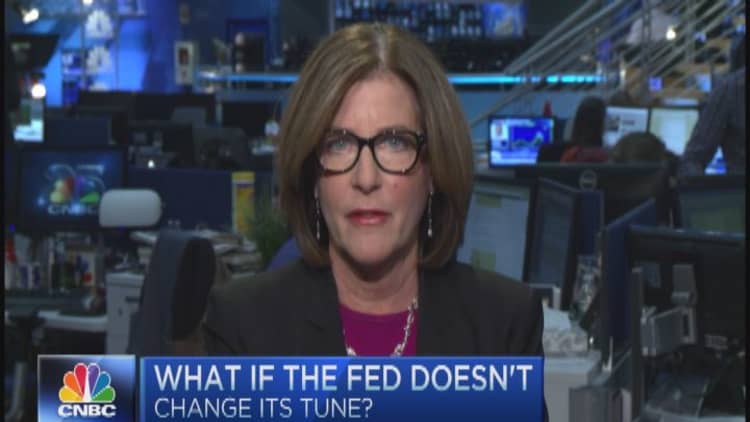
Traders are watching to see if the Fed will lift the market's spirits, as investors fret over a new set of worries–including Russia.
The central bank releases its statement and economic forecasts at 2 p.m. ET, and Fed Chair Janet Yellen will then brief the media at 2:30 p.m. The Fed is widely expected to tweak the language in its statement by removing the phrase "considerable time," a reference to how long it intends to keep rates low.
Fed officials have said it is on a path to raise rates by the middle of next year, if the economy continues to improve. The "considerable time" language is therefore seen as irrelevant, and the Fed is expected to include some new language, stressing it is not likely to move quickly to raise rates. Some Fed watchers expect to see a new word—"patience."
Stocks seesawed Tuesday, amid concerns about Russia and as oil first plunged and then stabilized. But stocks sagged late in the day, even as West Texas Intermediate oil closed with a slight gain for the first time in four sessions. WTI was up 2 cents at $55.93 per barrel, but Brent traded below $60 in late trading. Treasury yields also moved lower, as investors sought safety in U.S. government debt. The 10-year was at 2.05 percent in late trading.
Spreads continued to widen in the high-yield market, as investors focused on an early selloff in energy and the meltdown of the Russian ruble.
Read MoreAppleRussia online sales halted on ruble woes
Markets were spooked as the ruble collapsed, despite the Russian central bank's dramatic hike in interest rates to 17 percent.
Russian oil giant Rosneft's issue of 625 billion rubles ($9.1 billion) worth of bonds last week was seen as one catalyst for the decline. The currency initially stabilized after the rate hike, but then went into free fall. "The major players that came in and reversed it were probably corporates that were short of dollars," said Robert Sinche, global strategist at Amherst Pierpont Securities.
Analysts said the point of pain for markets may come from Russian corporate bonds, much of which is denominated in dollars. "I think rather than have the central bank come in and fight the speculators in the FX market, I think they'd be better to help corporates," said Sinche.
Spreads on Russian corporate bonds have widened dramatically. For instance, bonds of Norilsk Nickel, which had been holding up were also hit. The bond, expiring in 2020 was yielding 8.87 percent Tuesday, up from 7.65 percent on Friday, according to Jefferies London office.
Read MoreThis could be Putin's surprise move: Expert
JPMorgan economists, meanwhile, expect the Fed to remove the "considerable time" language, but they do not expect it to comment on recent market volatility.
"While we see some risk of this occurring, we think the most likely outcome is that the committee refrains from highlighting the latest flare-up in the markets," they wrote in a note."
"Our best guess, however, is that their concerns have not materially increased. The ruble doesn't matter for the U.S. economy. Lower oil prices and interest rates are good things. The most obvious bad thing is the widening in high-yield credit spreads. But note that in the most recent discussion of financial stability risks in the Monetary Policy Report, the Fed highlighted narrowing credit spreads as a sign of heightened risk-taking—a concern which was echoed in the staff's latest assessment of financial stability risks in the October minutes," according to JPMorgan economists.
Read MoreFed should focus on US, not Russia: LaVorgna
Ward McCarthy, chief financial economist at Jefferies said the Fed will continue on the same course. The Fed "will continue to do what they have to do but they'll have to do it gently," he said. "I know I'm an outlier, but I think they'll continue to use the 'considerable time' language."
One concern about the Fed's language change is that it will have to also assure markets it is not ready to move quickly to hike rates. "In the October meeting, they satisfied the hawks by making the timing of the rate liftoff specifically data dependent and therefore none of the hawks objected or dissented to the use of that expression in October. If the doves are happy with it, why take it out?" said McCarthy.
Read MoreWill Fed ditch 'considerable time?'
Instead, he said the Fed's biggest challenge would be explaining its view on inflation, which is running below its target and could stay low with falling oil prices. "They've been pretty opaque and confusing. They may have a crystal clear view, but they didn't share it with us," McCarthy said.
Traders, meanwhile are keeping a wary eye overseas, and on the oil market. There is also CPI for November, and the current account at 8:30 a.m. At 10:30 a.m., the government releases oil inventory data.
"Keep your eye on the price of oil. Keep your eye on junk bonds. That's where the action is," said Steve Massocca of Wedbush Securities.
If history is a guide, stocks could be higher at the end of Wednesday. Bespoke said the S&P 500 has averaged a gain of 0.35 percent on Fed days. That compares with an average gain of 0.03 percent for all trading days during the past 20 years.
Since the financial crisis when the Fed cut rates to zero, the S&P has been up an average 0.45 percent on Fed day, but more recently it has been flattish. After the October meeting, it was actually down 0.14 percent, but it was up in the four prior meeting days.


